
When you read this,
GNOME Shell 3.2 will
(hopefully!) have finally transitioned to Debian s
testing suite.
Planet GNOME readers might think
Debian now has outdated versions of software even in their development
versions, or the distribution s development marches at glacial pace.
Wheezy GNOME users will finally have a Shell that matches the rest
of their GNOME components, something that works with the
Shell extensions website and much
less problems and limitations compared to 3.0.2.
The reality is that GNOME 3.2 s packaging was quite ready back when it
was released in late September, but a number of not-so-desirable situations
held GNOME Shell from transitioning to testing until today, four months
later. So, what happened?
TL;DR: transitioning from GNOME 2 GNOME 3 is not so easy if you
want to keep testing
in a sane state, and when you need to deal with
dozens of indirectly related packages, for more than 10 architectures but it
shouldn t take nearly a full year
, either
Let s go back to the last months of 2010. Debian
squeeze is in
very deep freeze, and the release team and many Debian developers are
focusing on squashing as many release critical bugs as they can, in order to
make Debian 6.0 the great release it ended up being. The GNOME project has
recently delayed the big launch of
GNOME 3.0 again, until
March 2011; Debian has already settled on GNOME 2.28 for its release,
although it will end up cherry-picking many updates from the 2.30 release
modules.
With most of the stabilization work being done, many Debian GNOME team
members were at that time working on packaging very early versions of what
would end up being GNOME 3.0 technology: GTK+3.0, GNOME Shell, Mutter and
some brave users even tried to use it via the experimental archive.
On February 6th, Debian 6.0 was released, and soon after, on April 6th,
GNOME made a huge step forward with the much anticipated
release of GNOME 3.0.
At that time, Debian developers were busy breaking
unstable as
much as they could, as it s tradition on the weeks following a major
release, and the Debian GNOME team was able to start moving some GNOME 3.0
libraries (those which were parallel-installable with their GTK+2.0
versions) to unstable.
However, moving the bulk of GNOME 3.0 to unstable wasn t so easy. When
you start doing that, you need to be sure you re ready to have all affected
packages in a transitionable state as soon as possible, to minimise the
chances of blocking transitions of unrelated packages via the dependencies
they pick up with rebuilds. All the packages involved in a transition need
to be ready to go in the same testing run , for all supported
architectures. When you re dealing with dozens of GNOME source packages at
the same time, many of which introduce new libraries, or worse, introduce
incompatible APIs that affect many more unrelated packages, things get
hairy, and
you need a plan.
So,
Joss outlined what a sane
approach to this monster transition could look like. The amount of work to
do was what we call fun on
#debian-gnome. In a nutshell, we
had to deal with quite a few transitions, starting with
having a newer version of libnotify in unstable, and a pre-requisite for
that was making sure all the packages using libnotify1 were ready to use the
source-incompatible libnotify4, and this meant preparing patches and NMUs
for many of our packages, as well as many others not under our control.
Before starting a controlled transition like this one, we had to get an
ACK from the release team, who was busy enough handling other huge
transitions like Perl 5.12, so by the time we got our own slot, we were well
into Summer.
With libnotify done in August, it was time to get our hands dirty with
more exciting stuff, like getting Nautilus in testing. This meant bumping a
soname and requiring all packages providing Nautilus extensions to migrate
to GTK+3.0, or drop the extension entirely, as you can t mix GTK+2.0 and
GTK+3.0 symbols in the same process. However, in GNOME 3.0, automounting
code had moved from Nautilus to gnome-settings-daemon, so in order to not
break filesystem automounting in testing for an unreasonable amount of time,
both Nautilus and g-s-d needed to go in at the same time. The fun thing is
that g-s-d dragged glib2.0, gvfs, gnome-control-center, gdm3, gnome-media,
gnome-session and gnome-panel into the equation, so this transition needed
extra planning and a lot more work than initially expected: migrating all
nautilus extensions, plus ensuring all Panel applets had migrated to GTK+3.0
and the new libpanel-applet-4 interface. In short, this was the
monster transition
we were trying to avoid.
By the time all this mess was sorted out, GNOME 3.2 had been released,
and for what users said, it was
a lot better than 3.0. We still had
no more than a few bits and pieces of 3.0 in testing, and we were working
hard to get 3.0 in wheezy. With all the excitement around 3.2, at times it
was difficult to explain outsiders why we were beating a dead 3.0 horse
Going back to our huge transition, it was just a matter of time before all
the packages would be built and be ready to enter, on the same run, in
testing.
A few weeks later, in early November and after several rounds of
mass-bug-filings, fixing unrelated FTBFS, many NMUs, package removal
requests and dealing with any possible problem that could block our
transition, everything seemed to be set, and our release team magicians had
everything in place for the big magic to happen. However, our
first clash
with the rest of Debian happened a few hours before our victory, in the form
of an unannounced ruby-gnome2 upload which resetted the count for everyone.
It was fun to see the release team trying all sorts of black magic in an
attempt to mitigate the damage. Fortunately, after a few tries they managed
to fool britney (the script that handles package transitions from unstable
to testing) somehow, and the hardest part of the job was done with just one
day of delay.
At last, the core of GNOME 3 was in testing, and testing users found soon
after. The rest of the week saw a cascade of hate posts against GNOME 3 in
Planet Debian, and personally I
didn t find that especially motivating to keep on working on the rest of
GNOME bits. With experimental clear of GNOME 3.0 stuff, we finally were able
to focus on packaging whatever GNOME 3.2 components were not already done,
and preparing for what should be a plain simple transition of GNOME 3.0 to
3.2.
After our share of wait for a transition slot, as Perl 5.14, ICU and
OpenSSL were in the line before us, and after dealing with a minor tracker
0.12 transition, we were ready for our next episode:
evolution-data-server.
At first sight, we thought this would be a lot easier, but it still
got a bit hairy
due to evo-data-server massive soname bumps. We were
given our slot
just before Christmas, after a few weeks of wait for others to finish their
migration rounds, and most of the pack entered wheezy a few days before the
new year.
No rejoicing, though, as GNOME Shell 3.2 didn t make it. First, we
discovered it was FTBFS on kFreeBSD architectures, as NetworkManager had
been promoted from optional to required, for apparently no good reason,
leaving the BSD world in the cold, including our exotic GNU/kFreeBSD
architectures. Now, let s clarify that I m a supporter of the Debian
kFreeBSD architectures and was really happy to see it accepted as a
technology preview in squeeze. However, as you know, GNOME Shell currently
requires hardware acceleration to run, a requirement hardly met in kFreeBSD,
unless you re using a DRI1 X driver. We seriously doubted anyone had
ever ran a GNOME 3 session on kfreebsd-*. However, if it didn t
build, it was a blocker bug for GNOME Shell. We considered creating
different meta-packages for kFreeBSD architectures, to conclude it d be a
mess, so our awesome Michael Biebl ended up cooking up a patch that restored
the ability to build the Shell without NetworkManager support.
With this out of our way, we just needed to upload Michael s fix and
watch the buildds do their part of the job. Or maybe not?
Enter Iceweasel 9.
In parallel, and with incredible bad timing, Iceweasel 9.0 was uploaded
to Debian the very same day it was released by Mozilla. Again, it greeted us
with a nasty surprise: yet another mozjs API change, which made gjs FTBFS,
which meant our kFreeBSD fixes would be unusable until someone who knew Gjs
internals well enough bit the bullet and worked around the new API changes.
Again, Michael Biebl tried to be our saviour, but unfortunately wasn t able
to fix all the problems, so we tried to focus on plan B.
Mozilla had released a fork of the mozjs that is included in Firefox, so
that embedders would have a bit less of a hard time with these recurrent API
changes. This was based on Firefox 4, and was already being packaged by
Ubuntu. Gjs would build using this older version just fine, so we just
needed to get it in Debian as soon as possible. We just needed to find a
sucke^Wvolunteer that would be inclined to maintain the beast. Only after a
few weeks we managed to get Chris Coulson, the Ubuntu packager, to maintain
the package directly through the Debian archive via package syncs. However,
his package had only been auto-compiled in the three Ubuntu architectures,
that is amd64, armel and i386. It s late January 2012, and we ve been
fighting this war for 10 months.
After getting some help from Michael to get the new package in shape for
Debian standards, we were excited to sponsor it for Chris. Duh, after a few
days in the NEW fridge, it was rejected by the ftp-masters. The license
statement was missing quite a few details, so I went ahead and sacrificed a
few hours of my copious free time to get this sorted out. A few days later,
mozjs was accepted, but the result was horrible. It was
very red.
mozjs didn t build on half of our targets.
Mike Hommey was quick to
file a bug
and point us to the most obvious fuckups. As he had dealt with this in the
past as the Iceweasel maintainer, all of these issues were fixed and patches
were ready to be applied verbatim or with minimal changes to our sources.
With mozjs finally built successfully (although with
severe problems on ia64),
we were finally able to rebuild Gjs against it, upload GNOME Shell with our
kFreeBSD fixes and wait until today for this mess to be over. Whew.
I can t say I ve enjoyed all the stages of this ride. Some bumps on the
road were clearly there to test our patience, but it has helped me get back
in touch with non-leaf GNOME packaging, which was all I was doing for a
while due to being super-busy lately with studies. It also reminds me of the
privilege of working side by side with some awesome people, not only Joss,
Michael, Sjoerd, Laurent or Gustavo, to name just a few Debian GNOME team
members, but also the receptive release team members like Julien or Cyril,
and NEW-processing record-breaking ftp-master Luca. Without them, we might
be trying to figure out the Nautilus transition since last Summer.
We really hope GNOME 3.4 will be a piece of cake compared to this. ;)
 When you read this,
GNOME Shell 3.2 will
(hopefully!) have finally transitioned to Debian s testing suite.
Planet GNOME readers might think
Debian now has outdated versions of software even in their development
versions, or the distribution s development marches at glacial pace.
Wheezy GNOME users will finally have a Shell that matches the rest
of their GNOME components, something that works with the
Shell extensions website and much
less problems and limitations compared to 3.0.2.
The reality is that GNOME 3.2 s packaging was quite ready back when it
was released in late September, but a number of not-so-desirable situations
held GNOME Shell from transitioning to testing until today, four months
later. So, what happened?
TL;DR: transitioning from GNOME 2 GNOME 3 is not so easy if you
want to keep testing in a sane state, and when you need to deal with
dozens of indirectly related packages, for more than 10 architectures but it
shouldn t take nearly a full year, either
Let s go back to the last months of 2010. Debian squeeze is in
very deep freeze, and the release team and many Debian developers are
focusing on squashing as many release critical bugs as they can, in order to
make Debian 6.0 the great release it ended up being. The GNOME project has
recently delayed the big launch of
GNOME 3.0 again, until
March 2011; Debian has already settled on GNOME 2.28 for its release,
although it will end up cherry-picking many updates from the 2.30 release
modules.
With most of the stabilization work being done, many Debian GNOME team
members were at that time working on packaging very early versions of what
would end up being GNOME 3.0 technology: GTK+3.0, GNOME Shell, Mutter and
some brave users even tried to use it via the experimental archive.
On February 6th, Debian 6.0 was released, and soon after, on April 6th,
GNOME made a huge step forward with the much anticipated
release of GNOME 3.0.
At that time, Debian developers were busy breaking unstable as
much as they could, as it s tradition on the weeks following a major
release, and the Debian GNOME team was able to start moving some GNOME 3.0
libraries (those which were parallel-installable with their GTK+2.0
versions) to unstable.
However, moving the bulk of GNOME 3.0 to unstable wasn t so easy. When
you start doing that, you need to be sure you re ready to have all affected
packages in a transitionable state as soon as possible, to minimise the
chances of blocking transitions of unrelated packages via the dependencies
they pick up with rebuilds. All the packages involved in a transition need
to be ready to go in the same testing run , for all supported
architectures. When you re dealing with dozens of GNOME source packages at
the same time, many of which introduce new libraries, or worse, introduce
incompatible APIs that affect many more unrelated packages, things get
hairy, and
you need a plan.
So, Joss outlined what a sane
approach to this monster transition could look like. The amount of work to
do was what we call fun on
When you read this,
GNOME Shell 3.2 will
(hopefully!) have finally transitioned to Debian s testing suite.
Planet GNOME readers might think
Debian now has outdated versions of software even in their development
versions, or the distribution s development marches at glacial pace.
Wheezy GNOME users will finally have a Shell that matches the rest
of their GNOME components, something that works with the
Shell extensions website and much
less problems and limitations compared to 3.0.2.
The reality is that GNOME 3.2 s packaging was quite ready back when it
was released in late September, but a number of not-so-desirable situations
held GNOME Shell from transitioning to testing until today, four months
later. So, what happened?
TL;DR: transitioning from GNOME 2 GNOME 3 is not so easy if you
want to keep testing in a sane state, and when you need to deal with
dozens of indirectly related packages, for more than 10 architectures but it
shouldn t take nearly a full year, either
Let s go back to the last months of 2010. Debian squeeze is in
very deep freeze, and the release team and many Debian developers are
focusing on squashing as many release critical bugs as they can, in order to
make Debian 6.0 the great release it ended up being. The GNOME project has
recently delayed the big launch of
GNOME 3.0 again, until
March 2011; Debian has already settled on GNOME 2.28 for its release,
although it will end up cherry-picking many updates from the 2.30 release
modules.
With most of the stabilization work being done, many Debian GNOME team
members were at that time working on packaging very early versions of what
would end up being GNOME 3.0 technology: GTK+3.0, GNOME Shell, Mutter and
some brave users even tried to use it via the experimental archive.
On February 6th, Debian 6.0 was released, and soon after, on April 6th,
GNOME made a huge step forward with the much anticipated
release of GNOME 3.0.
At that time, Debian developers were busy breaking unstable as
much as they could, as it s tradition on the weeks following a major
release, and the Debian GNOME team was able to start moving some GNOME 3.0
libraries (those which were parallel-installable with their GTK+2.0
versions) to unstable.
However, moving the bulk of GNOME 3.0 to unstable wasn t so easy. When
you start doing that, you need to be sure you re ready to have all affected
packages in a transitionable state as soon as possible, to minimise the
chances of blocking transitions of unrelated packages via the dependencies
they pick up with rebuilds. All the packages involved in a transition need
to be ready to go in the same testing run , for all supported
architectures. When you re dealing with dozens of GNOME source packages at
the same time, many of which introduce new libraries, or worse, introduce
incompatible APIs that affect many more unrelated packages, things get
hairy, and
you need a plan.
So, Joss outlined what a sane
approach to this monster transition could look like. The amount of work to
do was what we call fun on 

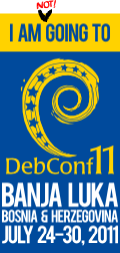

 I mentioned this briefly yesterday, but now I'll try to summarize the
story of a great surprise and a big moment for me.
I mentioned this briefly yesterday, but now I'll try to summarize the
story of a great surprise and a big moment for me.
 I've been following GNOME 3.0's development since Debian got the first
GNOME Shell snapshots uploaded to experimental. While my first experience,
on an old, 2 or 3 generations behind Athlon 800MHz with 512MB of RAM was
horrid due to the lack of features (it wasn't even an alpha!) and the
incredible slowness due to the crappy Radeon 9200, I've seen it evolve to
the gem that was released yesterday.
I haven't been so excited about GNOME since GTK+ and GNOME 2.0 were
released after their eternal development cycle, and was happy to see how
positive the atmosphere in
I've been following GNOME 3.0's development since Debian got the first
GNOME Shell snapshots uploaded to experimental. While my first experience,
on an old, 2 or 3 generations behind Athlon 800MHz with 512MB of RAM was
horrid due to the lack of features (it wasn't even an alpha!) and the
incredible slowness due to the crappy Radeon 9200, I've seen it evolve to
the gem that was released yesterday.
I haven't been so excited about GNOME since GTK+ and GNOME 2.0 were
released after their eternal development cycle, and was happy to see how
positive the atmosphere in 
 A great finish for a great weekend is getting to visit Jordi and Anna,
after 3 years of no luck, and finally meeting their lovely 2.5 years old
daughter Martina.
This weekend just rocks, and I'm already looking forward to next year's!
A great finish for a great weekend is getting to visit Jordi and Anna,
after 3 years of no luck, and finally meeting their lovely 2.5 years old
daughter Martina.
This weekend just rocks, and I'm already looking forward to next year's!
 I'm happy to meet so many friends from the
I'm happy to meet so many friends from the
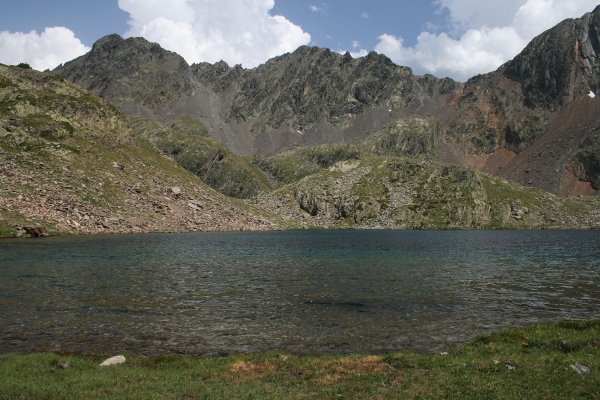
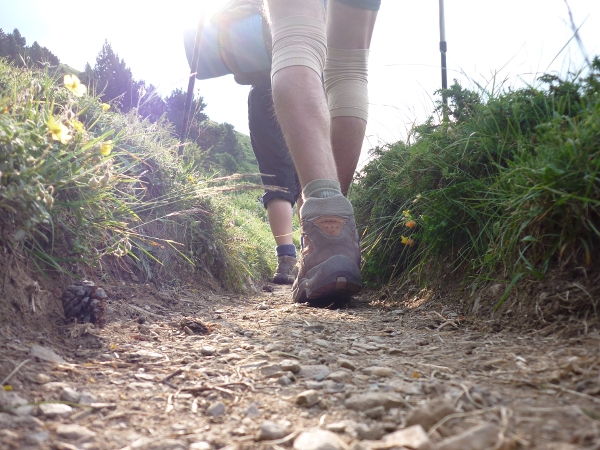 We managed to complete this challenge without facing major problems or
pains, and after the first five our six days, our legs seemed to have
gotten used to the daily effort and it started to be easier and easier.
Our morale kept growing as days passed and we advanced east. When I
started walking on a cold and rainy morning in Hondarribia, after barely
no rest in the night bus to Ir n, I thought for myself that it was
improbable that we'd manage to get anywhere near Catalunya, that one of
us would get injuried way before, or we'd just give up and go for the easy
beach vacation in the Basque Country.
We managed to complete this challenge without facing major problems or
pains, and after the first five our six days, our legs seemed to have
gotten used to the daily effort and it started to be easier and easier.
Our morale kept growing as days passed and we advanced east. When I
started walking on a cold and rainy morning in Hondarribia, after barely
no rest in the night bus to Ir n, I thought for myself that it was
improbable that we'd manage to get anywhere near Catalunya, that one of
us would get injuried way before, or we'd just give up and go for the easy
beach vacation in the Basque Country.
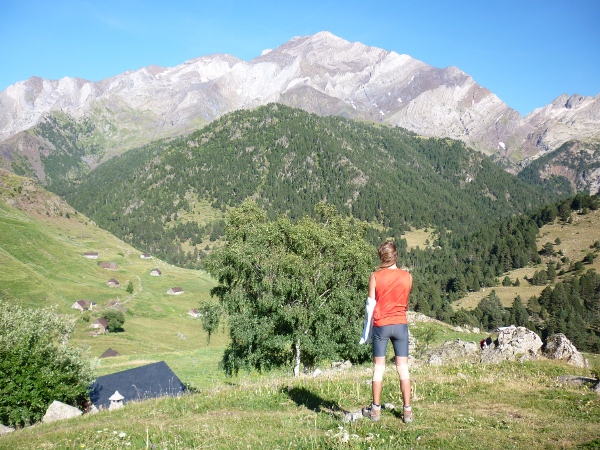
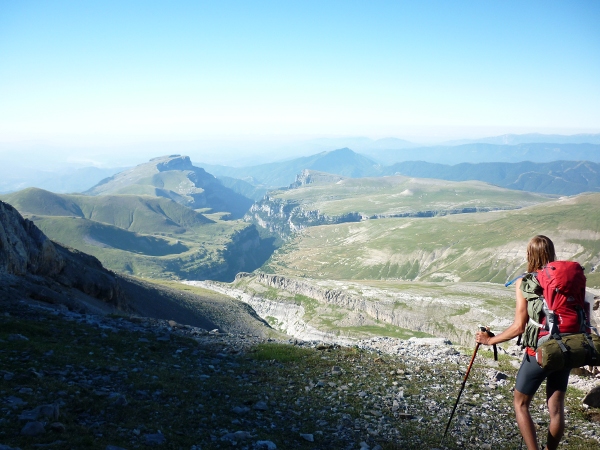
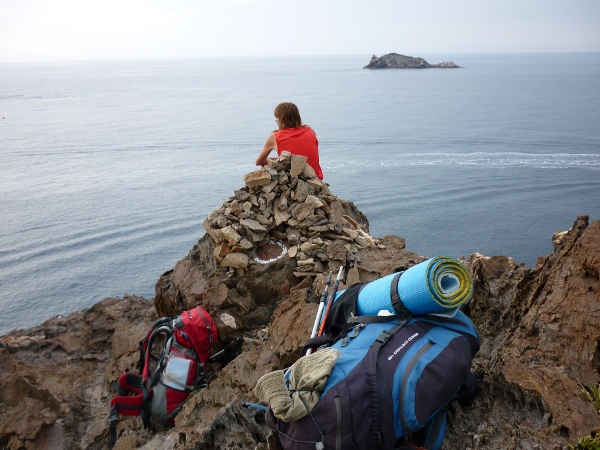
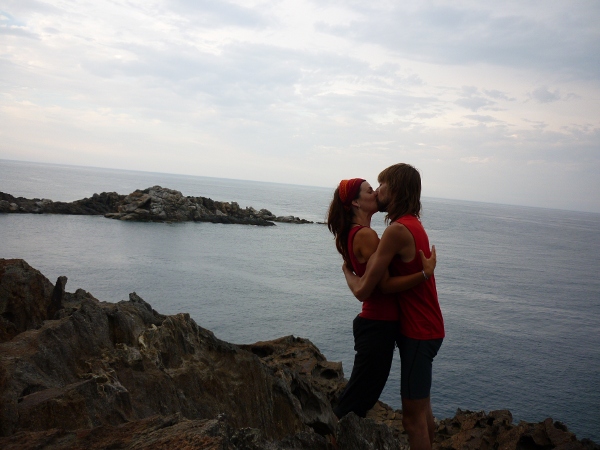 This adventure through GR 11 has been incredibly positive for us for
several reasons. We've learned a lot about ourselves and strengthened our
relation, and now I know how powerful drive can be; to get somewhere, no
matter how far, it's really easy if you just believe you can do it and
desire to get there.
Maria and I are proud of what we've done, and no wonder we're looking
for new challenges. An obvious one would be repeating this experience,
going through the French side of the Pyrenees, but for now, the Corsican
GR 20 seems the most appealing. We'll see, next summer!
This adventure through GR 11 has been incredibly positive for us for
several reasons. We've learned a lot about ourselves and strengthened our
relation, and now I know how powerful drive can be; to get somewhere, no
matter how far, it's really easy if you just believe you can do it and
desire to get there.
Maria and I are proud of what we've done, and no wonder we're looking
for new challenges. An obvious one would be repeating this experience,
going through the French side of the Pyrenees, but for now, the Corsican
GR 20 seems the most appealing. We'll see, next summer!